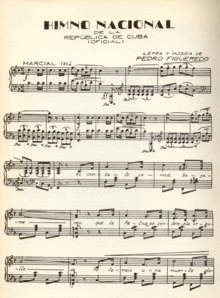- La Bayamesa
-
El Himno de Bayamo English: The Bayamo Anthem 
National anthem of
 Cuba
Cuba
Also known as La Bayamesa
English: The Bayamo SongLyrics Perucho Figueredo Music Perucho Figueredo (Antonio Rodriguez-Ferrer musical introductory notes), 1867 Adopted 1902 Music sample La Bayamesa (Instrumental)El Himno de Bayamo (The Bayamo Anthem) is the national anthem of Cuba. It was first performed during the Battle of Bayamo in 1868. Perucho Figueredo, who took part in the battle, wrote and composed the song. The melody, also called La Bayamesa, was composed by Figueredo in 1867. On October 20, 1868 the Cuban forces obtained the capitulation of the Spaniard authorities in Bayamo, the jubilant people surrounded Figueredo and asked him to write an anthem with the melody they were humming. Right on the saddle of his horse, Figueredo wrote the lyrics of the anthem, which was longer than the current official version. Figueredo was captured and executed by the Spaniards two years later. Just before the firing squad received the Fire command, Figueredo shouted the line from his anthem: Morir por la Patria es vivir. Officially adopted in 1902, the anthem was retained after the revolution of 1959. The arrangement commonly used, without credit in Cuba, is believed to be that of José Norman, author of Cuban Pete [1]. The Cuban composer Antonio Rodriguez-Ferrer, was the author of the musical introductory notes to the Cuban national anthem.[1]
In addition to the Himno de Bayamo, there are two other well-known Cuban songs called La Bayamesa. The first Bayamesa was composed in 1851 by Carlos Manuel de Céspedes and José Fornaris at the request of their friend Francisco Castillo Moreno, who is sometimes also credited with the lyrics. Many years later, in 1918, the composer and trovador Sindo Garay, from Santiago de Cuba, composed a song that he called Mujer Bayamesa; popular usage shortened the title to La Bayamesa.
Lyrics
Originally the song had six stanzas. The last four stanzas were excluded in 1902. First, because it hurt the pride of the Spanish. Furthermore, it was well seen in the lyrics of one nation to another is not respected. Another important aspect is that it was too long compared to most of the hymns.
Spanish lyrics Translation First stanza ¡Al combate, corred, Bayameses!,
Que la patria os contempla orgullosa;
No temáis una muerte gloriosa,
Que morir por la patria es vivir.Hasten to battle, men of Bayamo!
The motherland looks proudly to you;
Do not fear a glorious death,
Because to die for the fatherland is to live.Second stanza En cadenas vivir es vivir
En afrenta y oprobio sumido,
Del clarín escuchad el sonido;
¡A las armas, valientes, corred!To live in chains is to live
In dishonour and ignominy,
Hear the clarion's call;
Hasten, brave ones, to battle!Third stanza (excluded) No temáis; los feroces íberos
son cobardes cual todo tirano
no resisten al bravo cubano;
para siempre su imperio cayó.Fear not the fierce Iberian
which all are cowardly tyrant
not resist the brave Cuban
forever the empire fell.Fourth stanza (excluded) ¡Cuba libre! Ya España murió,
su poder y su orgullo ¿do es ido?
¡Del clarín escuchad el sonido
¡¡a las armas!!, valientes, corred!Free Cuba! Spain already died,
their power and pride is gone do?
Hear the sound of the bugle
To arms!, Brave, run!Fifth stanza (excluded) Contemplad nuestras huestes triunfantes
contempladlos a ellos caídos,
por cobardes huyen vencidos:
por valientes, supimos triunfar!Behold our hosts triumphant
behold it to them fallen
overcome by fleeing cowards:
by brave, we found success!Sixth stanza (excluded) ¡Cuba libre! podemos gritar
del cañón al terrible estampido.
¡Del clarín escuchad el sonido,
¡¡a las armas!!, valientes, corred!Free Cuba! We shout
the terrible roar of the cannon.
Hear the sound of the trumpet,
To arms!, Brave, run!References
External links
- Cuban National Anthem Website Cuban National Anthem interpreted by Cuban artists with music and voice.
- http://www.nacion.cult.cu/en/musica.htm Cuban site with different Mp3 files
- Las Bayamesas Article in Spanish on the three songs named La Bayamesa
- http://www.nacion.cult.cu/en/sobrehimno.htm
National anthems of North & Central America Independent countries Antigua and Barbuda · Bahamas · Barbados · Belize · Canada · Costa Rica · Cuba · Dominica · Dominican Republic · El Salvador · Grenada · Guatemala · Haiti · Honduras · Jamaica · Mexico · Nicaragua · Panama · Saint Kitts and Nevis · Saint Lucia · Saint Vincent and the Grenadines · Trinidad and Tobago · United StatesDependencies DenmarkNetherlandsAnguilla · Bermuda · British Virgin Islands · Cayman Islands · Montserrat · Turks and Caicos IslandsUnited StatesComplete List · Africa · Asia · Europe · North America · Oceania and the Pacific Islands · South AmericaAnguilla · Antigua and Barbuda · Aruba · Bahamas · Barbados · Bermuda · Bonaire · Cayman Islands · Cuba · Curaçao · Dominica · Dominican Republic · Grenada · Guadeloupe · Haiti · Jamaica · Martinique · Montserrat · Puerto Rico · Saint Kitts and Nevis · Saint Lucia · Saint Vincent and the Grenadines · Trinidad and Tobago · British Virgin Islands · U.S. Virgin Islands
Complete List · Africa · Asia · Europe · North America · Oceania and the Pacific Islands · South AmericaCategories:- Cuban songs
- National anthems
- National symbols of Cuba
- Spanish-language songs
- 1868 songs
Wikimedia Foundation. 2010.
